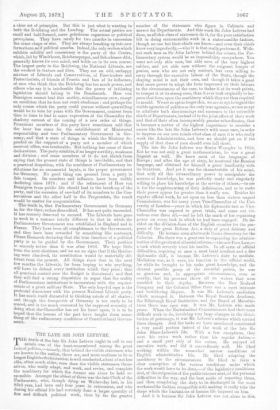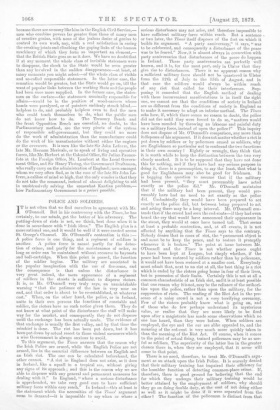THE LATE SIR JOHN LEFEVRE.
THE death of the late Sir John Lefevre ought to call to our minds one of the least-remembered among the great facts of politics,—namely, that behind the visible statesmen who are known to the nation, there are, and must continuo to be so long as English administration is well conducted, a host of not less able, often much abler, men than the visible statesmen them- selves, Who really adapt, and work, and revise, and complete the machinery for which the former can alone be held re- eponsible. Amongst the ablest of these was the late Clerk of the Parliaments, who, though dying on Wednesday last, in his 83rd year, had been only four years in retirement, and who during hie official life had certainly done a larger quantity of fine and. difficult political work, than by far the greater
number of the statesmen who figure in Cabinets and answer for Departments. And this work Sir John Lefevre had done, as all this class of statesmen do it, for the pure satisfaction felt in doing statesmanlike work in a statesmanlike fashion, though no one but their chiefs can know—and even their chiefs know very imperfectly,---who it is that really performs it. With- out such men as Sir John Lefevre behind the scenes, the Par- liamentary system would be an impossibility everywhere. You want not only able men, but able men of the very highest calibre, and yet able men without the exigeant temper of genius, men who are not only content, but oven willing to carry through the executive labour of the State, though the shaping mind is not their own, and though it takes a good deal more power to adapt the form impressed on their labours to the circumstances of the case, to tinker it at its weak points, to temper it at its strong ones, than it ever took originally to im- press that form upon the machinery which they are thus required to mould. We are so apt to forget this, we are so apt to regard the visible agencies of politics as the only true agencies, we are so apt to attribute both shortcomings and successes to the ostensible chiefs of Departments, instead of to the joint effect of their work and that of their often incomparably gmater subordinates, that it becomes a matter of the highest importance to consider a career like the late Sir John Lefevre's with some care, in order to impress on our own minds what class of men it is who really work the Administration, and how we should get on if the supply of that class of men should ever fall short.
The late Sir John Lefevre was Senior Wrangler in 1818. But he was not only a great mathematician, he was a great linguist as well. Ho knew most of the languages of Europe ; and after the age of sixty, he mastered the Russian language, and obtained for himself a great familiarity with its literature. And yet it was the characteristic of his mind, that with all this extraordinary power to manipulate the sources of knowledge, he was perfectly ready and singularly willing to place his knowledge at the service of others,--to use it for the supplementing of their deficiencies, and so to make their power appear far greater than it really was. Besides his regular official work, he sat upon no less than sixteen unpaid Commissions, was for many years Vice-Chancellor of the Uni- versity of London—years in which his diplomatic tact as Vice- Chancellor was exposed to great trials, and came out vic- torious over them all,—and he left the mark of his organising power on every task in which he had been engaged. He de- cided on the division-lines of the English counties for the pur- poses of the great Reform Act, a duty of great delicacy and difficulty. He became soon afterwards Under-Secretary for the Colonies. His share was a great one in organising the adminis- tration of the greatest of allsocial reforms,—the new Poor Law,— a task which severely tried his health. In all sorts of official difficulties, requiring at once a most lucid intellect and a fine diplomatic shill, it became Mr. Lofevre's duty to mediate. Mediation was, as it were, his function in the official world, for while he brought to his tasks great knowledge, and the clearest possible grasp of the essential points, he was so gracious and, in appropriate circumstances, oven so courtly, that his presence threw oil on waters that wore troubled to their depths. Between the New Zealand Company and the Colonial Office there was a most intricate and bewildering dispute. It was Mr. Lofevre's mediation which arranged it. Between the Royal Scottish Academy, the Edinburgh Royal Institution, and the Board of Manufac- tures there was open war. It was Mr. Lefevre who made peace. When the Ecclesiastical Commissioners had their most difficult work to do, involving very large changes in the distri- bution of patronage, it was Mr. Lefevre 'e scheme which carried these changes. And the tasks we have mentioned constituted a very small portion indeed of the work of the late Sir John Shaw-Lefevre's life. With a few exceptions, they were his extra work rather than his regular duties,—,
and a small part only of the extras. He enjoyed all executive work, and did it marvellously well. He liked
working within the some what narrow conditions of English administrative life. He liked adapting the machinery to the circumstances. He liked to form a clear conception of the various conditions under which the work would have to be done,—of the legislative conditions
first, of the exigencies of the public interest next, of the personal difficulties in the way, and the best mode of removing them, and then completing the ditty to be discharged in the most workmanlike fashion compatible with making it really take the shape which the limitations of human life imposed on him. And it is because Sir John Lefevre was not alone in this,
because there are BO many like him in the English Civil Service,— men who combine powers far greater than those of many men of creative genius, with none of the jealous desire of genius to control its own work, nay, with a real satisfaction in easing the creaking joints and clinching the gaping links of the human machinery of which they form so important an element,— that the British State goes on as it does. We have no doubt that if at any moment the whole class of invisible statesmen were to disappear, the shock to the State would be even greater than any involved in the sudden disappearance—at least, at many moments you might select—of the whole class of visible and so-called responsible statesmen. In the latter case, the sensation would be greater, but the State would go on, till the want of popular links between the working State and the people had been once more supplied. In the former case, the states- men on the surface—the statesmen nominally responsible for affairs—would be in the position of wood-carvers whose hands wero paralysed, or of painters suddenly struck blind,— helpless to do, and probably helpless even to find the men who could teach themselves to do, what the public men do not know how to do. The Treasury Bench and the front Opposition Bench are essential, no doubt, to the Parliamentary method, are the very pivots of the system of responsible self-government, but they could no more do the work of administration than the manufacturer could do the work of his manufactories without either the engines or the overseers. It is men like the late Sir John Lefevre, the late Mr. Herman Meriv ale, or to speak of living and operative forces, like Mr. Herbert at the Colonial Office, Sir Julian Paunce- fote at the Foreign Office, Mr. Lambert at the Local Govern- ment Office, and Sir Henry Thring, the Government Draftsman, who really carry on the administration of England ; men amongst whom we very often find, as in the case of the late Sir John Le- fevre, a calibre of mind so high, that the only wonder is that they do not take the command, instead of almost delighting to aid in unobtrusively solving the somewhat Kantian problem,— how Parliamentary Government is a priori possible.































 Previous page
Previous page